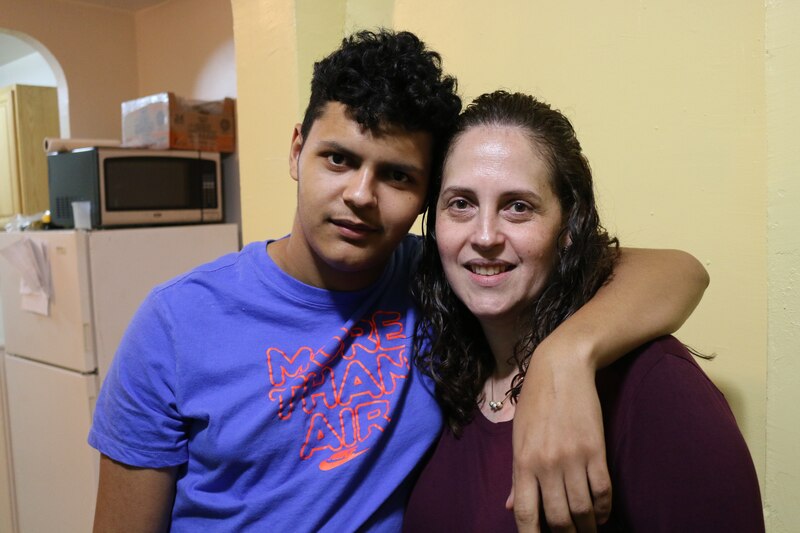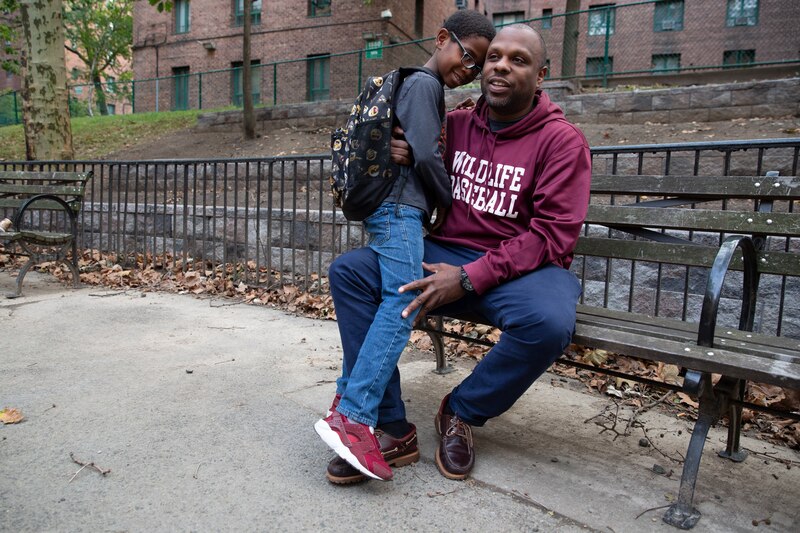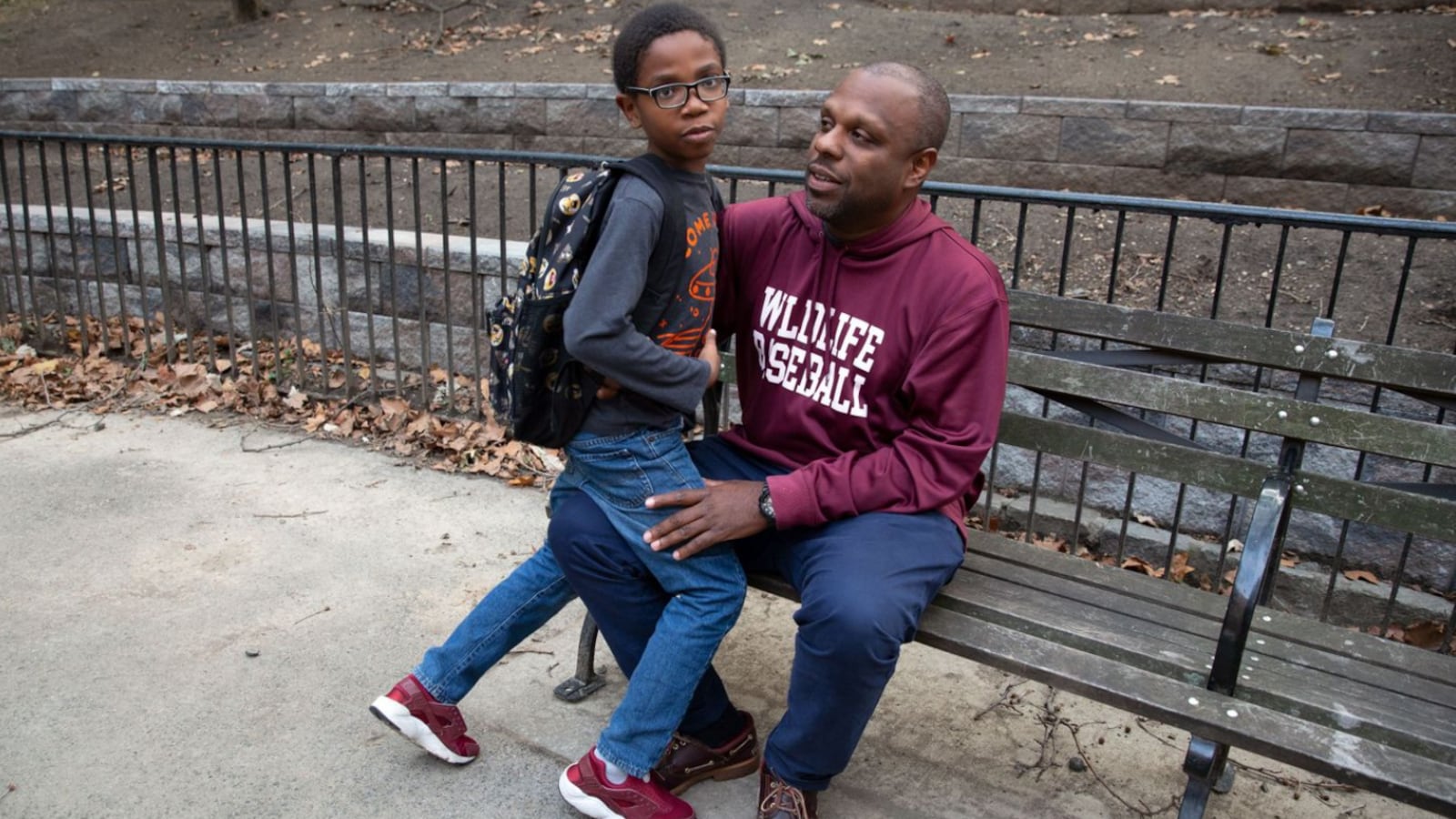This is part of an ongoing collaborative series between Chalkbeat and THE CITY investigating learning differences, special education and other education challenges in city schools.
Neifi Jorge entered his Bronx high school barely reading at a second-grade level, struggling to identify words like “stove” and “behind.”
Though the Tremont youth had a special education plan, known as an individualized education program or IEP, since the second grade, it had repeatedly been changed to lower the requirements for advancing to the next grade.
At the start of high school, it only listed two goals based on the school’s evaluation of his needs — neither of which related to reading.
“They would just pass you along because you’re a good kid, and you never get in trouble,” said Jorge, now 18. “Nobody ever sat down and told me, ‘This is the problem you have, this is why you have trouble reading.’”
Jorge was assessed for special education services by city school employees — missing out on what education advocates say are more thorough private examinations.
The information gap between evaluations provided by the city compared to those done privately — which typically cost over $5,000 — is not unique to Jorge. Interviews with more than two dozen advocates, parents, and experts revealed a flawed two-tiered evaluation system that leaves many students’ needs unaddressed.
Like many aspects of the city’s public school system, the evaluation process is complicated for parents to navigate — and savvy families who can pay for private evaluations have a big advantage.
School psychologists, who are responsible for conducting special education evaluations, work under heavy caseloads, which can make it challenging to conduct quality evaluations. The assessments themselves are often delayed, leaving students without vital services for months.
Meanwhile, families who can afford neuropsychological evaluations, often not covered by insurance, can get a clearer sense of their child’s disabilities — along with pages of recommendations that spell out what services are needed.
By contrast, the city’s evaluations don’t offer specific diagnoses, like dyslexia or attention deficit disorder.
Nor do they include specific recommendations for support, leaving that to a team that includes educators and families in crafting a student’s learning plan. That puts more of an onus on parents to figure out what services they should advocate for.
‘It Hurts My Heart’
“Every student should have a neuropsych evaluation,” said Dr. Claire Golden, a developmental neuropsychologist who previously worked in the public schools. “It hurts my heart that not every kid can get one who needs it — because they are very expensive.”
For Jorge’s mother, who works in housekeeping, understanding that an outside evaluation could have led to more help came too late.
“I didn’t know I could get services for him,” said Luz Montesino, Jorge’s mother. “I just knew I didn’t want to give up.”
He finally got a lifeline in 10th grade after a teacher at Bronx Leadership Academy II suggested to Jorge’s mother he could be eligible for a free neuropsychological exam through a program at Columbia University.

The evaluation, along with a pro bono lawyer from Advocates for Children, brought a raft of new support. The city began paying for him to attend a specialized private school with instruction more tailored to his needs. The city also was ordered in June to provide 1,000 hours of one-on-one after school tutoring in reading and writing to make up for years of inadequate services.
Jorge had been previously evaluated by school officials. But the comprehensive neuropsychological evaluation found he had a language disorder, and it detailed severe learning disabilities in reading, writing, and math.
Malcolm’s Search for Services
Some educators, advocates and neuropsychologists said the city’s evaluations are sufficient in many cases to connect students to the right support.
However, families who seek private testing often have more leverage to push for additional services — including through legal complaints aiming to make the education department pay for private school tuition.
Special education advocates said they almost always push their clients to get outside testing.
“It’s like not knowing whether you have heart disease or diabetes and taking insulin for the heart disease,” Elisa Hyman, a special education lawyer who often represents low-income clients, said of the city’s evaluations. “It’s critical to know what the underlying disability or diagnosis is so that you can identify appropriate interventions.”
Chancy Marsh believes his son’s public school evaluation has boxed the 8-year-old into a set of services that won’t allow him to reach his full potential. He’s hoping a private evaluation could change the course of his son’s academic career.
Marsh’s son, Malcolm, who is on the autism spectrum, attends a District 75 school in The Bronx reserved for students with the most severe disabilities. He already has been placed on an academic track that won’t earn him a regular high school diploma.

Marsh believes an independent evaluation would identify Malcolm as a good candidate for an individualized therapy known as ABA (Applied Behavioral Analysis) that few public schools offer despite the approach showing success with some autistic kids.
But for the past three years, the father of four hasn’t been able to cobble together enough funds to pay for a pricey evaluation.
“He is delayed, that’s a fact, but just because he’s delayed doesn’t mean he won’t be able to do normal, functioning things like anybody else,” said Marsh, of Parkchester, who works as a public school paraprofessional. “With what the DOE’s providing, I don’t know what it’s leading to.”
Private Tests More Intense
By law, school officials are obligated to refer students for special ed evaluations if they believe academic struggles could be related to a disability. They also are required to initiate an evaluation if a parent requests one.
Typically, those evaluations are conducted by school psychologists and other school staff, and include academic tests, an IQ test, a classroom observation, a social history, and a physical exam. If more specific challenges are suspected, schools can order assessments to identify physical and speech delays.
Neuropsychological exams offer more intense versions of those tests, along with assessments of the student’s memory and the ability to focus or regulate their own behavior.
The evaluators also make independent recommendations that aren’t bound by what services schools have on hand or how much they cost.
Agency policy prohibits the special education team from taking into consideration what services and class settings the school has available when deciding on appropriate accommodations for a student, education department officials said.
However, a policy shift implemented across the system in 2012 emphasizes serving special education students in neighborhood schools, as opposed to clustering them in schools focused on special education. That can put local schools in a bind when only a few students require a certain specialized service that’s particularly costly.
In practice, schools often “recommend what they have available as opposed to recommending what students need,” said Maggie Moroff, a disability policy expert at Advocates for Children.
$1,500 Doesn’t Go Far
Department officials defended the evaluation process while acknowledging they have “more work to do.”
“The DOE provides rigorous evaluations by licensed professionals and conducting high-quality evaluations is a focus of our professional development for clinicians,” said Danielle Filson, an education department spokesperson.
She said parents can request an independent assessment, paid for by the city, if they disagree with a school’s assessment. The education department will either grant the request — or, if the parent files a formal complaint, have to prove to a hearing officer that the school’s evaluation was sufficient.
Advocates contend that few families know they can request an independent evaluation from the department and are typically provided just $1,500 — well below the market rate. Education officials countered that the number of families getting independent evaluations paid for by the city has nearly doubled since the 2015-’16 school year.
The education department paid for roughly 3,700 independent evaluations last school year, because a school psychologist wasn’t available or after a parent request — up from 1,940 three years prior. Officials said the increase followed a concerted push to better inform parents of their options.
Still, some educators say private evaluations aren’t a silver bullet.
For one, outside evaluations are just one piece of information considered when creating a student’s learning plan. Parents said it can still be an uphill battle to secure certain services.
Mark Anderson, a Bronx educator who has helped develop over 100 special ed learning plans, said interpreting test results and deciding what services a student receives should be a collaborative process between school staff, parents, and even students. Evaluations alone, he said, don’t necessarily show what’s best.
“It’s not a static, ‘You take a test and we provide the services and then you’re done,’” Anderson said. “The question should be, ‘Is what I’m doing actually improving outcomes for this child?’ That’s the hard part.”
Delays Compound the Problem
The process of getting evaluations from the city can be a battle unto itself.
Some parents said they struggled to have their children evaluated within the 60-day legal timeframe, a concern backed up by an audit from the state comptroller released in May.
More than 5,100 students referred for evaluation — or 29% — did not have evaluations conducted on time in the 2016-17 school year, the audit found. It took, on average, 96 days to complete — and in one case, 334 days.
Education officials criticized the audit’s methodology for stopping the 60-day clock when a student’s education plan meeting was held, rather than when the evaluation was actually conducted.
But since the city’s troubled special education data system doesn’t keep track of when evaluations are completed, the comptroller’s office justified the team meeting date as a reasonable substitute.
Though the comptroller’s audit said the delays have improved slightly in recent years, the State Education Department earlier this year also put the city’s education department on notice for failing to comply with initial evaluation timeline mandates in nearly 32% of cases with preschool students and about a quarter of cases with school-aged students in 2017-’18.
The most obvious culprit for the timeline delays is a shortage of school psychologists, advocates said, adding that the delays are most acute for bilingual students because of the time it takes to secure a school psychologist who speaks their language.
City officials said they are working to conduct evaluations more quickly and have hired 100 new psychologists for the current school year.
‘It Took Almost a Year’
There are now 1,220 psychologists serving roughly 1,700 public schools — up from 1,117 five years ago. There are an additional 205 psychologists who handle evaluations for kids in charter schools, private schools and in pre-kindergarten — up from 132, education officials said.
They also said they’re replacing the current data system with one that will better track the services and progress of special education students, but haven’t provided a timeline for when it will launch.
Jessamyn Lee, a former city teacher whose daughter now attends a public school program for students with autism, said getting the evaluations her daughter needed to attend the program involved a battle that stretched out for months. She wound up shelling out $3,000 for a private evaluation to save time amid bureaucratic delays by the education department.
“I know the system, I worked for the system, I have people at my kid’s school advocating for my child and have the resources to put toward this,” said Lee, who lives in Brooklyn. “And it still took almost a year.”

